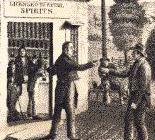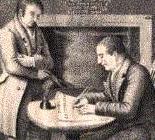
Gerrit Smith
- Temperance Activity
Throughout his activist career, Gerrit Smith worked in the cause of
Temperance. Himself a smoker and drinker in his college days at Hamilton, later
in life he became an abstainer, and an aggressive promoter of Temperance
activities. Active in many reforms, Smith's early promotion of Temperance as
well as other causes, took a back seat to his Abolition activities for many
years. After the close of the Civil War, he returned to more active work in
this cause, declaring in 1869:
"Our involuntary slaves are set free, but our millions of voluntary
slaves still clang their chains. The lot of the literal slave, of him whom
others have enslaved, is indeed a hard one; nevertheless, it is a paradise
compared with the lot of him who has enslaved himself to alcohol."
  Despite
his identification (particularly by contemporary drug policy advocates) with
Prohibition, Smith clearly articulated the view that government had no business
interfering with what citizens did (and drank) in their own homes. He was,
however, strongly opposed to the Dram Shop, or saloon. A strong believer in the
benefits of alcohol abstinence, Smith deviated from his general objection to
governmental involvement when it came to asylums for the insane as well as for
inebriates. These views were expressed before he himself was temporarily
confined to the Utica Asylum for the Insane, and before his brother, Peter Sken,
was confined to an inebriate asylum. His views on asylums, like dramshops, were
based on his belief in the limited role of government to protect public safety. Despite
his identification (particularly by contemporary drug policy advocates) with
Prohibition, Smith clearly articulated the view that government had no business
interfering with what citizens did (and drank) in their own homes. He was,
however, strongly opposed to the Dram Shop, or saloon. A strong believer in the
benefits of alcohol abstinence, Smith deviated from his general objection to
governmental involvement when it came to asylums for the insane as well as for
inebriates. These views were expressed before he himself was temporarily
confined to the Utica Asylum for the Insane, and before his brother, Peter Sken,
was confined to an inebriate asylum. His views on asylums, like dramshops, were
based on his belief in the limited role of government to protect public safety.
The images on this page are portions of two prints that hung in Gerrit
Smith's home, and that are now part of the collection at Syracuse University.
The first portrays a man taking his first drink. The second portrays him
signing the pledge of total abstinence.

|
